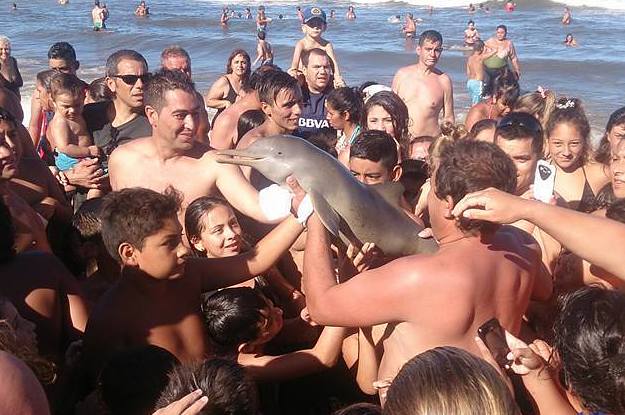A heartbreaking story you may not have heard about today. Also some insight into how technology has made people less caring.
A baby dolphin came too close to land in Argentina last week and was snatched up by tourists who proceeded to pass it around to take selfies until it died. They then threw it down on the beach and left it there. The dolphin was a Franciscana Dolphin of which only about 30 to 40 thousand are left in the world. The dolphin died of overheating due to the thick layer of fatty skin which gives it heat in the cold Atlantic water. Taking the dolphin out of the water rapidly caused it to dehydrate, overheat, and die.
A spokeswoman for Australia's arm of World Animal Protection said, "This terribly unfortunate event is an example of the casual cruelty people can inflict when they use animals for entertainment purposes, without thinking of the animal's needs."
People have been mistreating animals for years, but I believe that the modern selfie culture has created a monster which I'm not sure we can stop.
It has been well known that technology is ruining our relationships, our productivity, and our ability to focus. It's making us less empathetic as we strive to get the most likes on Facebook. Studies have shown that empathy has declined due to increased dependence on technology. Keeping our attention constantly on our phones or tablets has caused an inability to connect, not only with other people, but also with the world around us.
"In a culture defined by the selfie, nothing has lasting value but the self," says Galen Guengerich of the Washington Post, "Which means everyone and everything can be disposed of whenever something better shows up."
By turning the focus of our lives onto ourselves, instead of others, we convince ourselves that we should only focus on what's best for us. In doing this, we deprive ourselves of experiencing the world around us. If you're only doing something "for the selfie" or for likes on Facebook or Twitter you are missing a huge chunk of the life experience. Not only that, you could be enacting lasting damage on both your relationships, the world around you, and even your own self worth.
Jesse Fox conducted a study of 800 men for The Ohio State University in 2015 which linked increased selfies to narcissism and psychopathy. She believes it is a "self-reinforcing cycle". Meaning that, people who value themselves mainly for their appearance (called "self objectification") tend to post more selfies. They receive more feedback from friends online, which encourages them to post even more photos of themselves. This "self objectification" can lead to depression and eating disorders.
This story is proof that we need to put down the phone and think about what's around us instead. If we don't, we stand to damage ourselves, the people around us, and even the world at large.


Very well written, important, and so true! I have seen all these things happen among my own circle of friends and family. It's always felt somehow "wrong" and narcissistic to me to regularly and frequently post photos of yourself on FB. You give plenty of good, specific reasons why this kind of self-obsession is harmful to not only ourselves, but to our relationships and the very way we view the world around us. Thanks for a great, thought-provoking read. I wish I could share it on FB, but many of my friends might take it personally:) That's how much of a real phenomenon this "selfie culture" has become.
ReplyDeleteThanks for the kind words! I think anyone who has grown up in this era of changing technology and social norms can see these behaviors not only in our friends but in ourselves as well. I take and post a lot of selfies too! It's nice to have a reminder once in a while to put down the phone and experience life.
DeleteI didn't mean to write the post to attack anyone - like I said, I post selfies too - and I hope no one takes it personally. I wrote it more to urge people to just think about the ramifications of the selfie culture we live in.